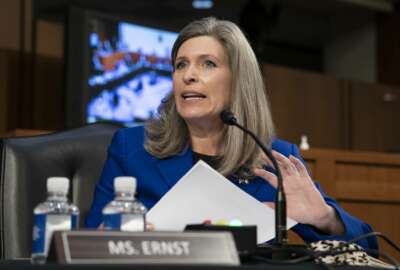

Carlen Capenos, the director of small business programs for the Defense Information Systems Agency, said a June 13 webinar will help small businesses understand...
One of the biggest obstacles for small businesses to work for the Defense Department is the need for a facility clearance.
It comes down to the old chicken or the egg discussion. The small business needs a facility clearance to win contracts. But that same company can’t get a facility clearance unless they have a sponsor on a contract.
Carlen Capenos, the director of small business programs for the Defense Information Systems Agency, said DISA has a plan to crack this conundrum.

“We’ve changed our participation plan. We have a template for anybody that’s proposing, small and large, that it’s part of our evaluation process when we’re doing indefinite delivery, indefinite quantity (IDIQ) contracts. But one thing that we’ve added into it is that the participation plan needs to include two companies who are small businesses that in the first year of the contract, should they win it, they will sponsor for the clearance,” Capenos said in an interview with Federal News Network, after speaking at the AFCEA NOVA Small Business Enterprise IT day earlier this month. “We put our first solicitation out for that, and we got zero pushback. We got the names of the companies, they’re going to get the facility clearance, so we think that’s a win. Now, we’ll see how it goes.”
DISA took this approach one step further by briefing this approach at the TRI-Association Small Business Advisory Panel last winter, which included large and small businesses, and other federal agencies.
Capenos said the reaction wasn’t necessarily as positive, but this is a challenge every agency faces and DISA’s attempt to fix it is welcomed.
“I’m hoping maybe we’ll get some forward movement, that it becomes a standard practice because for us and for a lot of the other agencies this is the number one barrier to entry for small businesses,” she said. “The idea actually came from a conversation with my peers from the National Security Agency. He asked, ‘What do you guys do? And how can you make primes do this? Can we make them do this?’ And I said, ‘Well, we can certainly ask them to do it.’ So that’s the approach DISA has taken. We want and need our large businesses to do this, and so now we’ve asked them to commit to it and put it in a documentation that’s part of a contract. So the expectation is they’re going to do it.”
The second piece to solving this challenge is coming on June 13 when DISA is hosting an industry day along with the Defense Counterintelligence Security Agency and others to help educate small firms on what it takes to get a facility clearance.
Capenos said if anybody wants to sign up for the briefing, they should send her office an email.
Another big challenge for small businesses that DISA is trying to solve is around subcontracting, specifically holding prime contractors accountable for meeting their goals.
Capenos said DISA is taking a multiple pronged approach.
“When we have our large contracts, single award or multi award, we ask the contracting officers if our office can help you monitor it? And they’ll say yes, because they have a whole lot of things they need to do,” she said. “For our really large contracts, like global network Global Solutions Management – Operations (GSM-O) II, SETI and Encore, we require all the contract holders to send in a biannual report on subcontracting, what they’ve done, who they’ve done it with, what scope of work and what dollar amount. Those reports come to us and we help look at them against their proposed goals against their subcontracting plan. And also just to help the contracting officers when they do their yearly contractor performance assessment reporting system (CPARS) to have the information on whether they’re compliant, whether they’re submitting the reports, whether they’re working with us on things like our matchmaking, we invite all of those contract holders to have tables to host to meet. If they’re not making their goals, what were they doing? Did they at least make a good faith effort to come to our event and meet with small businesses that want to do business with us?”
Capenos said she recently had a meeting with a large prime who was struggling to meet their subcontracting goals. She said just by reaching out to the large business for a meeting, they came prepared with a plan to increase their small business subcontracting efforts.
“There’s always a reason why primes are not meeting their subcontracting goals. Ours is more of the question, what are you going to do about it? I think just making sure that our large businesses know that we are monitoring it, that we do want to know and that we’re willing to help them, is important. You get more flies with honey than you do with vinegar,” she said. “But I’m not opposed to swinging a big stick either if we need to.”
DISA’s success with small businesses using honey, the big stick or really just ensuring opening communications is evident by their numbers.
In fiscal 2022, Capenos said DISA awarded almost $1.7 billion or almost 28% of all contracts to small firms. Its goal was 25%.
In 2023, DISA negotiated a lower overall small business percentage goal due to it taking over several large contracts like the Joint Warfighting Cloud Capability (JWCC), which has a $10 billion ceiling, and the Fourth Estate Network Optimization initiative, which is worth $11.5 billion.
“My goal has always been to increase the top line, which is how many actual dollars go to small businesses. If we did $1.7 billion from last year, can we do $1.8 billion this year?” she said. “To me, it’s all about increasing the dollars we’re awarding, no matter what our denominator is, and that’s always been my measure of success.”
Copyright © 2025 Federal News Network. All rights reserved. This website is not intended for users located within the European Economic Area.
Jason Miller is executive editor of Federal News Network and directs news coverage on the people, policy and programs of the federal government.
Follow @jmillerWFED

 First Look
First Look 